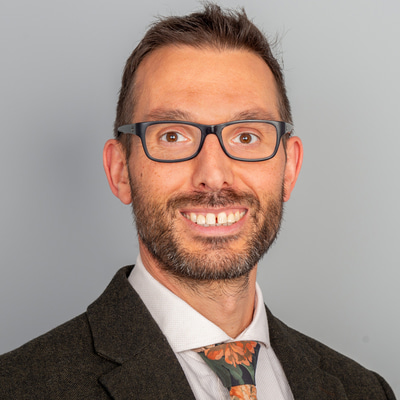- OT
- Life in practice
- Career development
- “Ophthalmology is one of the busiest specialisms in NHS hospitals”
“Ophthalmology is one of the busiest specialisms in NHS hospitals”
Optometrist turned ophthalmologist, Richard Stead, spoke to OT about his career journey and how a partnership approach delivers for patients and supports the NHS

29 February 2024
Ophthalmologist, Richard Stead, works as an NHS consultant in Nottingham and is the senior glaucoma consultant for the region. More recently he has also become a partner in Newmedica Nottingham. However, he began his eye care career as an optometrist in the community.
Qualifying as an optometrist in 1997, Stead had taken regular visits to his local optometrist after becoming a myope in his early teens. “I always looked forward to seeing the optician, probably because I could actually see properly when I left,” he said.
He later decided on a career in optometry during his A-Levels. “I felt it would appeal and provide a good vocational pathway after university. It was a great choice,” he shared.
Stead completed his pre-registration year on the High Street, which was complemented by experience in his then local hospital, where he would sit in with an ophthalmologist. Today he credits this experience for inspiring him to embark on a journey that would later see him retrain to become an ophthalmologist.
Here he shares his journey with OT.

What was it like retraining, and how long did it take?
I embraced the university experience the second time round. The academic work was straightforward and well organised. I had to self-fund, which meant working weekend locum shifts as a community optometrist.I applied to Leicester Warwick Medical School for the five-year course – unbeknown to me at the time, there was a new four-year medicine course for graduates. It worked in my favour as everyone else in a similar situation applied to the four-year course. The two of us who applied to the five-year course were successful. I stopped locum work by the fifth year to concentrate on the clinical learning.
Ophthalmology is one of the busiest specialists in NHS hospitals, with the pandemic adding to an already strained system. Add in conditions such as glaucoma, and it is a perfect storm for sight loss
I’m sure that retraining was a difficult decision to make at the time. What kept you motivated?
I’ve never regretted retraining. I enjoyed learning about the rest of the body. Knowing you are going to be responsible for people’s health was motivation enough. Working as an optometrist has also given me huge respect for the profession and the critical role it plays in eye care.Working as a doctor is challenging, but always interesting. There is an obligation to maintain your core knowledge and skills, and most doctors do foray into research. I thoroughly enjoy all these aspects. The training takes commitment and drive, with two years as a house officer and then the seven years to gain fellowship to the Royal College of Ophthalmologists. But whatever the role is, I would encourage all who are considering retraining to jump in with both feet.
What are your thoughts on optometrists advancing and taking on additional qualifications such as independent prescribing (IP) and glaucoma?
For me this is a no-brainer. We are in a position where demand is growing. We have a highly trained and motivated workforce who can contribute and help patients preserve their vision. I have supervised optometrists for both the College of Optometrists’ IP and Higher Diploma glaucoma certificates. They have all been highly motivated and a pleasure to work with.What are your thoughts on the current ophthalmologist waiting list numbers?
Ophthalmology is one of the busiest specialisms in NHS hospitals, with the pandemic adding to an already strained system. Add in conditions such as glaucoma, and it is a perfect storm for sight loss. This is where providers, such as Newmedica, are here to support, reducing time to treatment and allowing the NHS to focus on other critical care requirements.If stable patients can be seen in the community by appropriately trained optometrists, this offers a great way forward
What role can optometrists play in supporting the reduction of waiting lists and why?
Optometrists are a powerful resource that we can utilise through a partnership in patient care. This is the approach taken at Newmedica sites. These are locally owned and led by consultants, with local community optometrists contributing to holistic patient care.Optometrists are perfectly suited to make a difference for glaucoma patients. This work can be done in a community or hospital setting. However, real estate is at a premium in the hospitals. If stable patients can be seen in the community by appropriately trained optometrists, this offers a great way forward.
Use of optometrists to provide safe and sustainable care for stable chronic conditions is also advocated in the 2021 joint vision document with both the Royal College of Ophthalmologists and College of Optometrists. Many community practices have advanced diagnostic equipment, rivalling those in the hospital setting.
You have already developed from an optometrist to qualify as an ophthalmologist. Where do you see the role of the optometrist in five–10 years’ time?
I suspect more routine outpatient care will be delivered in community optometrist practices, including cataract pre-assessments and operation follow ups, glaucoma monitoring and diagnostics. Utilising optometrists in primary care who have undertaken higher qualifications should become the norm. It also has the added benefit of adding further variety in their work, enabling them to develop clinical skills that benefit patients.
Advertisement


Comments (0)
You must be logged in to join the discussion. Log in